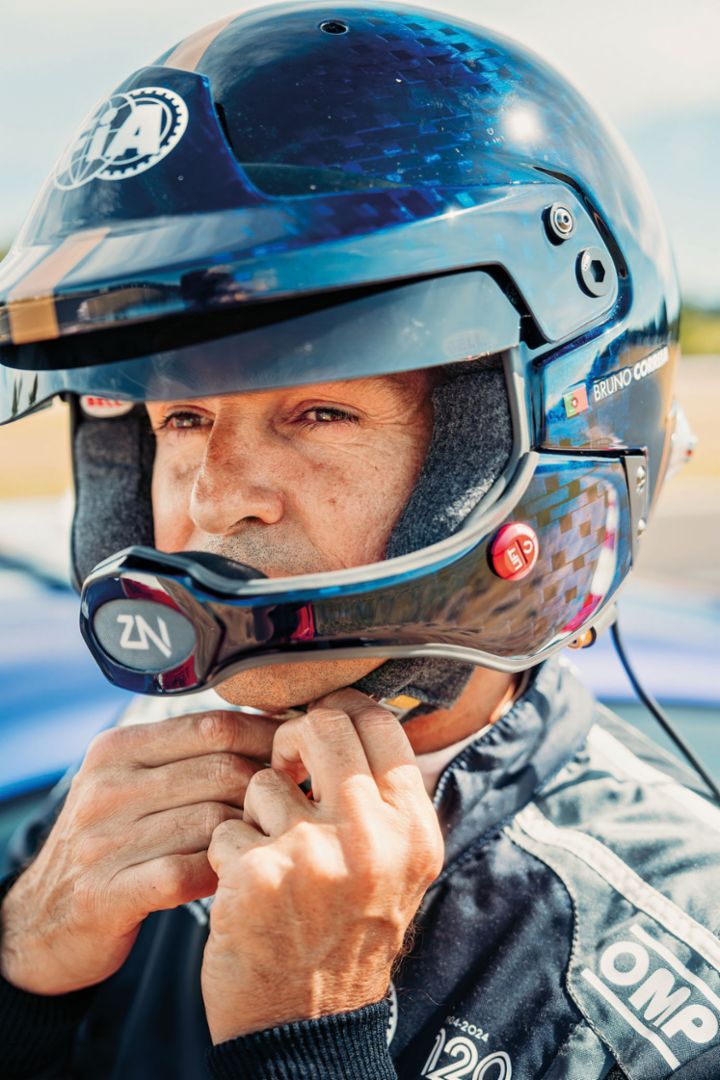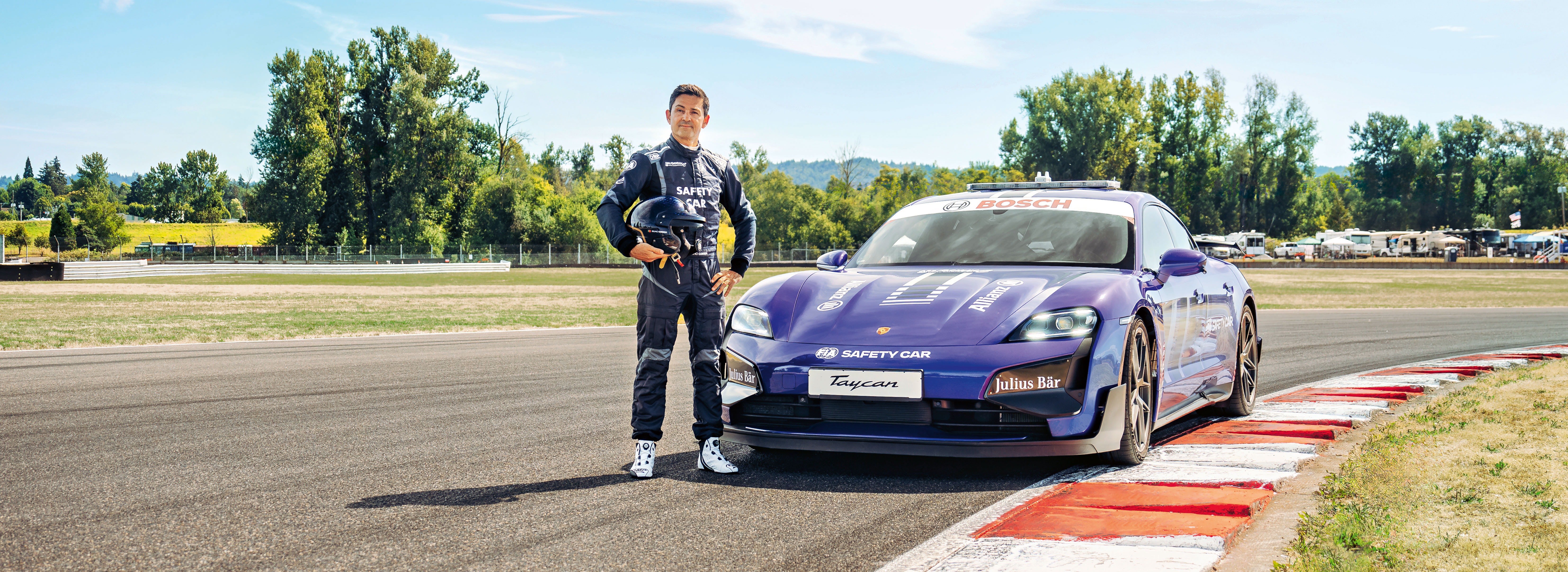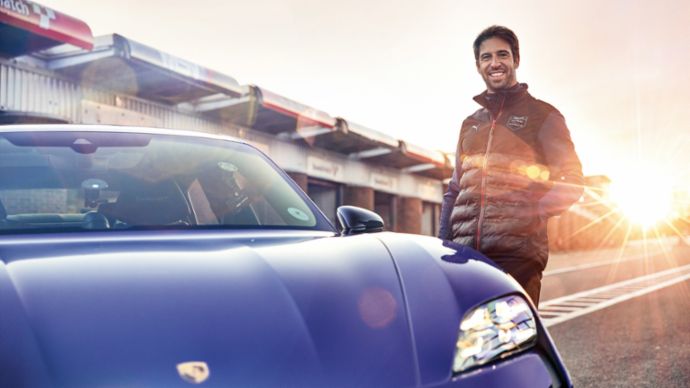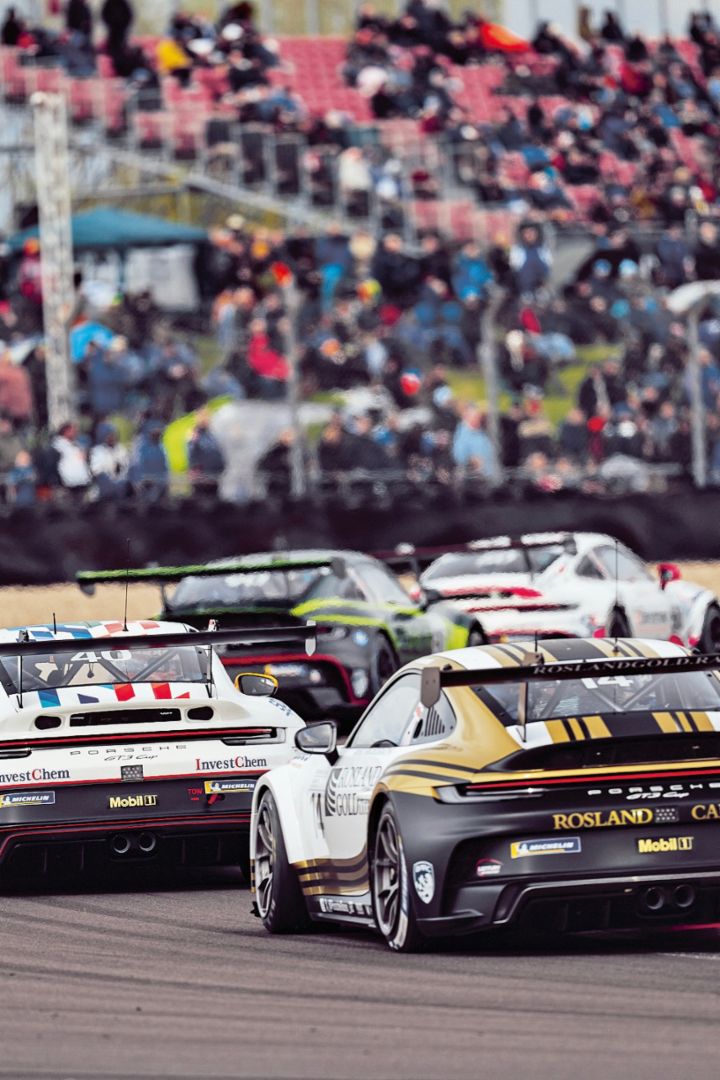Top Position
An extraordinary Track Experience: the Taycan Turbo GT has been the new safety car in Formula E since May 2024. At the E-Prix in Portland, Christophorus had the chance to experience firsthand the sheer performance of the most powerful production Porsche of all time – in the cockpit of safety car driver Bruno Correia.
The coveralls are a good fit, as is the fireproof hood on his head. With both the helmet and the four-point harness securely fastened, safety car driver Bruno Correia starts the electric motors of the Taycan Turbo GT with Weissach package. The Portuguese-born race car driver takes one last deep breath before activating Attack Mode and putting the pedal to the metal. The effects of the 1,240 newton meters of torque are instantaneous, pressing you back into the seat as the vehicle catapults down the track. With the landscape rushing by in a blur, the sensation of endless lightness takes over your entire body. It’s nothing short of breathtaking. Correia accelerates the vehicle to well over 200 kmh in just under seven seconds. With the curves approaching at lightning speed, he applies the brakes at just the right moment, maneuvering through the turn with expertise.
It feels like you could fly right off the course at any second. The Taycan glides along the track with a level of quiet and smoothness you wouldn’t have thought possible at these speeds. Centrifugal forces, the suddenly blurred view, and the air filled with the aroma of pine and warm rubber on the asphalt – these are the ingredients for a racing experience like no other.

Safety officer:
Bruno Correia has been driving the Porsche safety car in Formula E for three years.New safety car at the top
The penultimate E-Prix event of this year’s Formula E season will be held here at Portland International Raceway in the US state of Oregon this weekend in June 2024. Before the race, Christophorus has the exclusive opportunity to experience the new Taycan Turbo GT firsthand on an empty course, with Bruno Correia behind the wheel.

Premiere:
The new Taycan Turbo GT with Weissach package had its first assignment at the E-Prix in Berlin in May 2024 (above). Christophorus gets to take an exclusive lap on an empty course with Bruno Correia before the race in Portland.
At first glance, the racecourse itself is a surprising, almost incongruous sight in this picturesque landscape, the winding course blending seamlessly with the surrounding hills. As we approach the track for the first time, we see high-performance race cars navigating tight hairpin turns, but don’t hear the deafening sound typical of traditional top-level motorsport.
Instead, the air is filled with the elegant whispering of tires on the racecourse and the soft humming of battery-powered race cars zooming by at unbelievable speeds. But occasionally there are moments when a Taycan Turbo GT – and not a race car – is leading the pack out on the course, ever since the new electric sports car replaced the 2019 Taycan Turbo S as the official safety car for the all-electric Formula E racing series in May 2024. Now there are two variants of the car standing by at every Formula E race.
Experience in the cockpit
The Taycan Turbo GT is not only the most powerful production Porsche of all time, but also the most powerful safety car in a FIA world championship. The driver of this extraordinary vehicle is 47-year-old Bruno Correia, who has plenty of experience, having made the switch from go-karting to professional motorsport in 1994. He secured the class win in Formula Ford his first time competing as a 17-year-old rookie and clinched the title in the Spanish version of Formula Renault two years later. He became a driving trainer following an active career and then acquired his first position as safety car driver in the FIA World Touring Car Championship in France in 2009. Correia, who also drives the medical car in Formula 1, has been working to ensure safety on the world’s racecourses ever since.
What must it feel like to be able to call a vehicle like this your company car? “There’s nothing like it, of course,” says Correia with an amused look on his face. “The safety car is a key element that the race management activates whenever action needs to be taken on the course.” Any time safety hazards such as a broken-down vehicle, water, or debris need to be removed from the track before the race can resume safely. And that’s where Correia comes in. “My job is to take control of the situation again.”

Control center:
Depending on the situation, Correia can communicate with the drivers using various light signals.
On the job:
With a four-point harness, coveralls, fireproof clothing, and a helmet, safety comes first in the safety car too.Safety car with up to 1,108 PS
Correia is always standing by for every Formula E race, ready to jump into one of the two prepped Taycan Turbo GT vehicles at any moment. “As a representative of the Fédération Internationale de l’Automobile (FIA), I have a great deal of responsibility. Everyone’s eyes are on the safety car whenever it appears on the racecourse,” he explains.
The Taycan Turbo GT with Weissach package is not only easy on the eyes with its paint job in Purple Sky Metallic, but also delivers top performance, with up to 815 kW (1,108 PS; Taycan Turbo GT with Weissach package (WLTP)*: Electrical consumption combined: 20.8 – 20.6 kWh/100 km; CO₂ emissions combined: 0 g/km; CO₂ class: A)), acceleration from 0 to 100 kmh in 2.2 seconds, and a top track speed of 305 kmh. While the design of the vehicle without Weissach package in Shade Green Metallic is a little more understated, its performance is anything but, as it delivers the same power (Taycan Turbo GT (WLTP)*: Electrical consumption combined: 21.2 – 20.5 kWh/100 km; CO₂ emissions combined: 0 g/km; CO₂ class: A), acceleration from 0 to 100 kmh in 2.3 seconds, and a top track speed of 290 kmh. Regardless of the car that Correia pilots, an adrenaline rush is guaranteed.
The two Taycan vehicles typically share the stage in Formula E, alternating between primary and replacement car. The Taycan Turbo GT with Weissach package had the honor of initiating the new safety car era in the racing series during the premiere in Berlin, and the Taycan in Shade Green Metallic has been stealing the show here in Portland ever since.

E-Prix in Oregon:
The Taycan Turbo GT in Shade Green Metallic maintains safety on the racecourse in Portland.From motorsport to series production
Formula E was founded in 2011 with the aim of promoting the future of motorsport. In many ways, the racing series offers the ideal environment in which to experience the ambitions of Porsche in the development of all-electric drives. During a walk around the team tents, you can see Porsche engineers, mechanics, designers, and programmers all working together to fine-tune the race cars and get the absolute most out of them.
Specialized teams maintain contact at all times with the Weissach Research and Development Centre, where vehicle data can be interpreted in real time. The findings are also incorporated into series production. We have the opportunity to experience the most recent example ourselves today, the Attack Mode available in the new Taycan Turbo GT. The mode was originally developed for the Formula E Porsche 99X Electric race car, in which António Félix da Costa will secure first place this weekend in Portland. Once activated, Attack Mode can provide the Taycan Turbo GT with an additional 120 kW of power for 10 seconds.
“The Taycan Turbo GT’s power is from another world,” adds Correia after our drive on the empty racecourse. “It’s a Top Gun vehicle. Or to put it mildly, an amazing company car.” He ends up taking the safety car out just once this weekend, leading the drivers for a length of two laps – a comparably quiet E-Prix for Correia. But he always needs to keep focused and be ready to act at any moment, which he does with confidence, just like the race car drivers in the Porsche 99X Electric.
Thrilling season final
Works driver António Félix da Costa, a member of the TAG Heuer Porsche Formula E team, not only secures a win for himself in Portland, but also achieves a record time during free practice of 1:08.7987 minutes, which is the fastest lap so far on this racecourse in Formula E. It’s da Costa’s third win in a row and the fourth this season, which is more than any other driver this year.
The highlight for the works team occurs two weeks later during the season final in London. In the first race of the weekend da Costa’s Porsche teammate Pascal Wehrlein takes first place; in the second race coming in second is enough for him to secure the drivers’ title – just ahead of rival Mitch Evans.

World champion:
At the season final in London, Pascal Wehrlein secures the first Formula E title for the Porsche works team in the Porsche 99X Electric.Pascal Wehrlein is the world champion and is the first German champion in a single-seater since Nico Rosberg won Formula 1 in 2016. It’s the Porsche works team’s first world championship title in the fifth Formula E season. The team also wins a runner-up title in the team world championship and, with seven season wins, also manages to set a new Formula E record.
A final for the history books and a season full of highlights for Porsche, whether in the 99X Electric – or the new Taycan Turbo GT.
Consumption data
Taycan Turbo GT
Taycan Turbo GT with Weissach package
-
20.8 – 20.6 kWh/100 km
-
0 g/km
-
A Class




